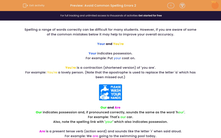Spelling a range of words correctly can be difficult for many students. However, if you are aware of some of the common mistakes below it may help to improve your overall accuracy.
Your and You're
Your indicates possession.
For example: Put your coat on.
You're is a contraction (shortened version) of 'you are'.
For example: You're a lovely person. (Note that the apostrophe is used to replace the letter 'a' which has been missed out.)
.jpg)
Our and Are
Our indicates possession and, if pronounced correctly, sounds the same as the word 'hour'.
For example: That's our car.
Also, note the spelling link with 'your' which also indicates possession.
Are is a present tense verb (action word) and sounds like the letter 'r' when said aloud.
For example: We are going to the swimming pool today.
If you are ever confused about whether to use our or are, look at the word following it. Can you own it? For instance, in the second example can you own a 'going'?
Words ending in 've
The phrases 'should have', 'could have' and 'would have' can be shortened to 'should've', 'could've' and 'would've'.
.jpg)
They are often incorrectly shortened to
'should of'
'could of'
'would of'
.jpg)
Tip: when you use an apostrophe, it indicates that you are missing out some letters in a phrase to shorten it. You don't normally add in extra letters or swap them for others.
Of and Off
The most straightforward and obvious way to distinguish a difference between these words is to focus on the f/ff sounds.
Of - the 'f' ending sounds like a 'v': 'ov'
Off - the double 'ff' ending has a much longer sound: 'offf'
Its and It's
Its indicates belonging or possession of something, just like 'his' or 'hers'.
For example: That's its collar.
It's is a contraction of 'it is'.
For example: It's a red collar.
.jpg)
Affect and Effect
Affect is a verb (action word). It means to cause something to happen.
For example: This miserable weather is really affecting my mood.
Effect is a noun and means the result of something.
For example: The effect of too much sun exposure was evident on his skin.
Let's practise this now in some questions.








